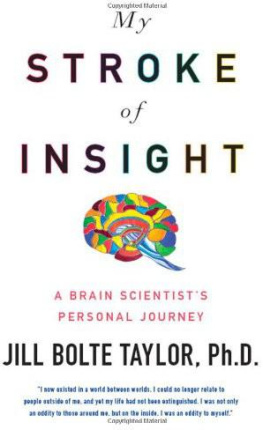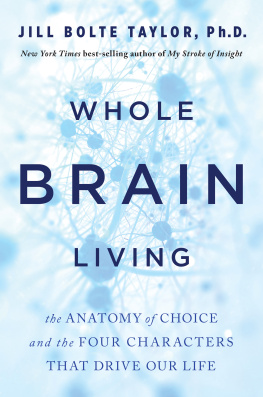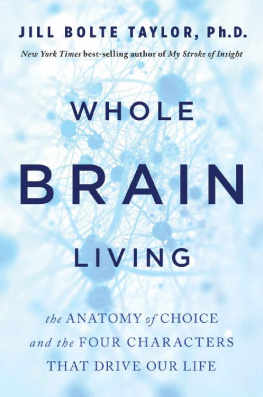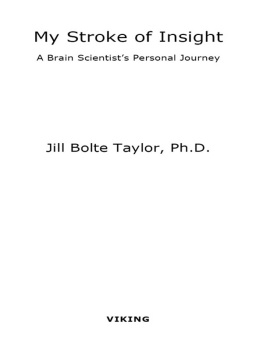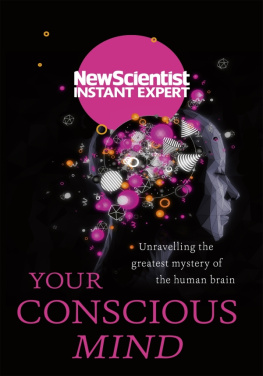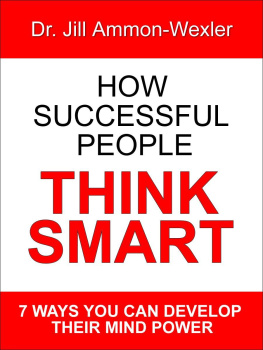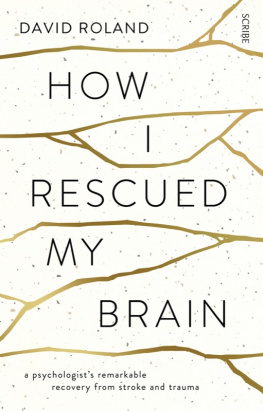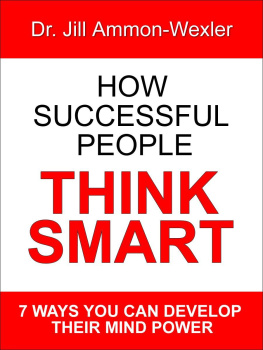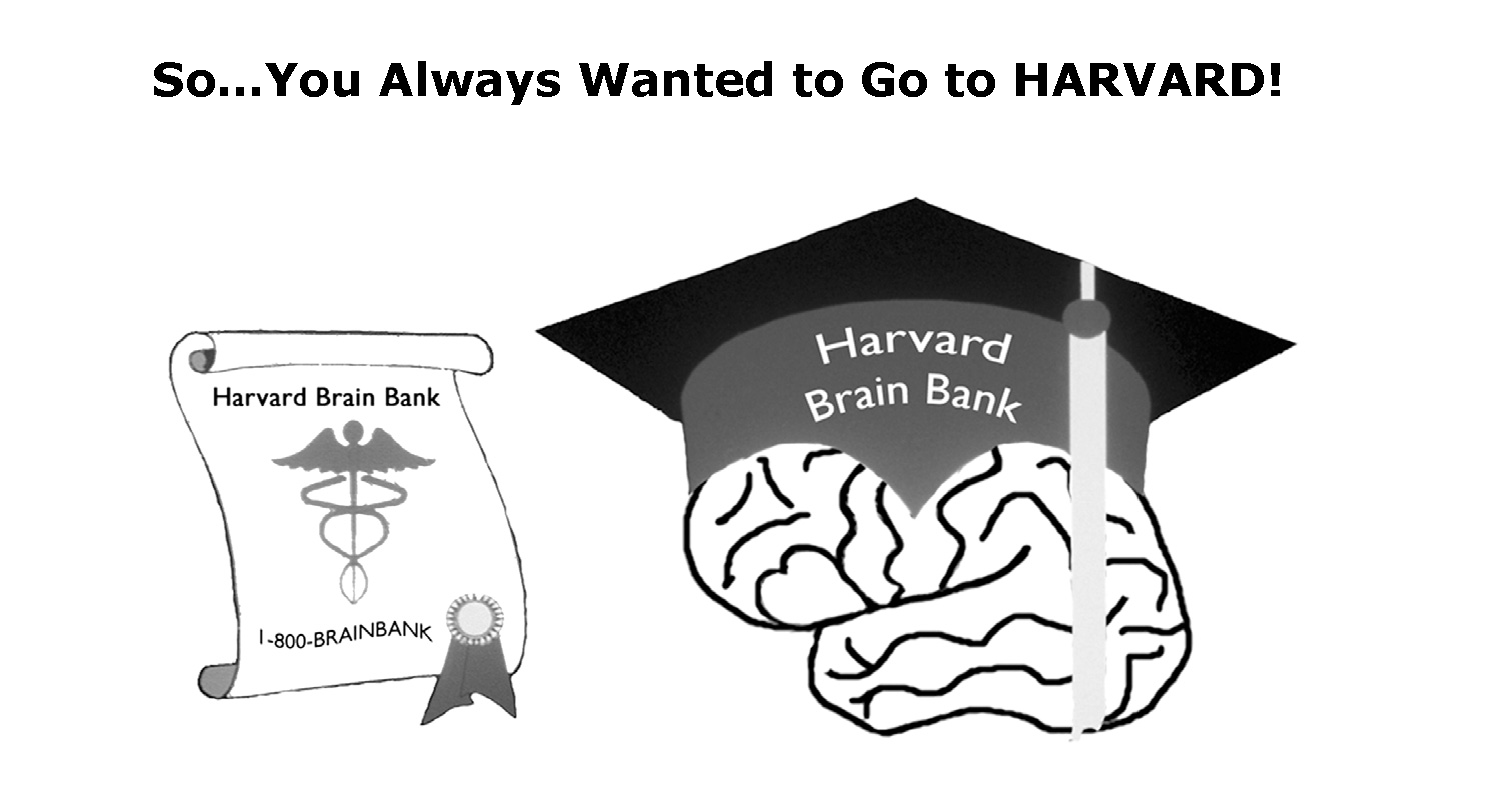1-800-BrainBank!
Oh, I am a brain banker,
Appendix A
Banking brains is what I do.
I am a brain banker,
Asking for a deposit from you!
Don't worry, I'm in no hurry!
Have you considered the contribution you can make When you are heaven bound, your brain can hang around, To help humanity, find the key to Unlock this thing we call insanity.
Just dial 1-800-BrainBank for information please, Educate then donate, it's free!
Oh, I am a brain banker,
Banking brains is what I do.
I am a brain banker,
Asking for a deposit from you!
Appendix B
Recommendations for Recovery by Jill Bolte Taylor, Ph.D.
My Stroke of Insight
Ten Assessment Questions:
1. Have you had my eyes and ears checked to make sure you know what I can see and hear?
2. Can I discriminate color?
3. Do I perceive three dimensions?
4. Do I have any sense of time?
5. Can I identify all of my body parts as mine?
6. Can I discriminate a voice from background noise?
7. Can I access my food? Can my hands open the containers? Do I have the strength and dexterity to feed myself?
8. Am I comfortable? Am I warm enough? Or thirsty? Or in pain?
9. Am I oversensitive to sensory stimulation (light or sound)? If so, bring me earplugs so I can sleep, and sunglasses so I can keep my eyes open.
10. Can I think linearly? Do I know what socks and shoes are? Do I know that my socks go on before my shoes?
Forty Things I Needed the Most
1. I am not stupid, I am wounded. Please respect me.
2. Come close, speak slowly, and enunciate clearly.
3. Repeat yourself - assume I know nothing and start from the beginning, over and over.
4. Be as patient with me the 20th time you teach me something, as you were the first.
5. Approach me with an open heart and slow your energy down. Take your time.
6. Be aware of what your body language and facial expressions are communicating to me.
7. Make eye contact with me. I am in here - come find me. Encourage me.
8. Please don't raise your voice - I'm not deaf, I'm wounded.
9. Touch me appropriately and connect with me.
10. Honor the healing power of sleep.
11. Protect my energy. No talk radio, TV, or nervous visitors! Keep visitation brief (five minutes).
12. Stimulate my brain when I have any energy to learn something new, but know that a small amount may wear me out quickly.
13. Use age-appropriate (toddler) educational toys and books to teach me.
14. Introduce me to the world kinesthetically. Let me feel everything. (I am an infant again.)
15. Teach me with monkey-see, monkey-do behavior.
16. Trust that I am trying - just not with your skill level or on your schedule.
17. Ask me multiple-choice questions. Avoid Yes/No questions.
18. Ask me questions with specific answers. Allow me time to hunt for an answer.
19. Do not assess my cognitive ability by how fast I can think.
20. Handle me gently, as you would handle a newborn.
21. Speak to me directly, not about me to others.
22. Cheer me on. Expect me to recover completely, even if it takes twenty years!
23. Trust that my brain can always continue to learn.
24. Break all actions down into smaller steps of action.
25. Look for what obstacles prevent me from succeeding on a task.
26. Clarify for me what the next level or step is so I know what I am working toward.
27. Remember that I have to be proficient at one level of function before I can move on to the next level.
28. Celebrate all of my little successes. They inspire me.
29. Please don't finish my sentences for me or fill in words I can't find. I need to work my brain.
30. If I can't find an old file, make it a point to create a new one.
31. I may want you to think I understand more than I really do.
32. Focus on what I can do rather than bemoan what I cannot do.
33. Introduce me to my old life. Don't assume that because I cannot play like I used to play that I won't continue to enjoy music or an instrument, etc.
34. Remember that in the absence of some functions, I have gained other abilities.
35. Keep me familiar with my family, friends, and loving support. Build a collage wall of cards and photos that I can see. Label them so I can review them.
36. Call in the troops! Create a healing team for me. Send word out to everyone so they can send me love. Keep them abreast of my condition and ask them to do specific things to support me - like visualize me being able to swallow with ease or rocking my body up into a sitting position.
37. Love me for who I am today. Don't hold me to being the person I was before. I have a different brain now.
38. Be protective of me but do not stand in the way of my progress.
39. Show me old video footage of me doing things to remind me about how I spoke, walked, and gestured.
40. Remember that my medications probably make me feel tired, as well as mask my ability to know what it feels like to be me.
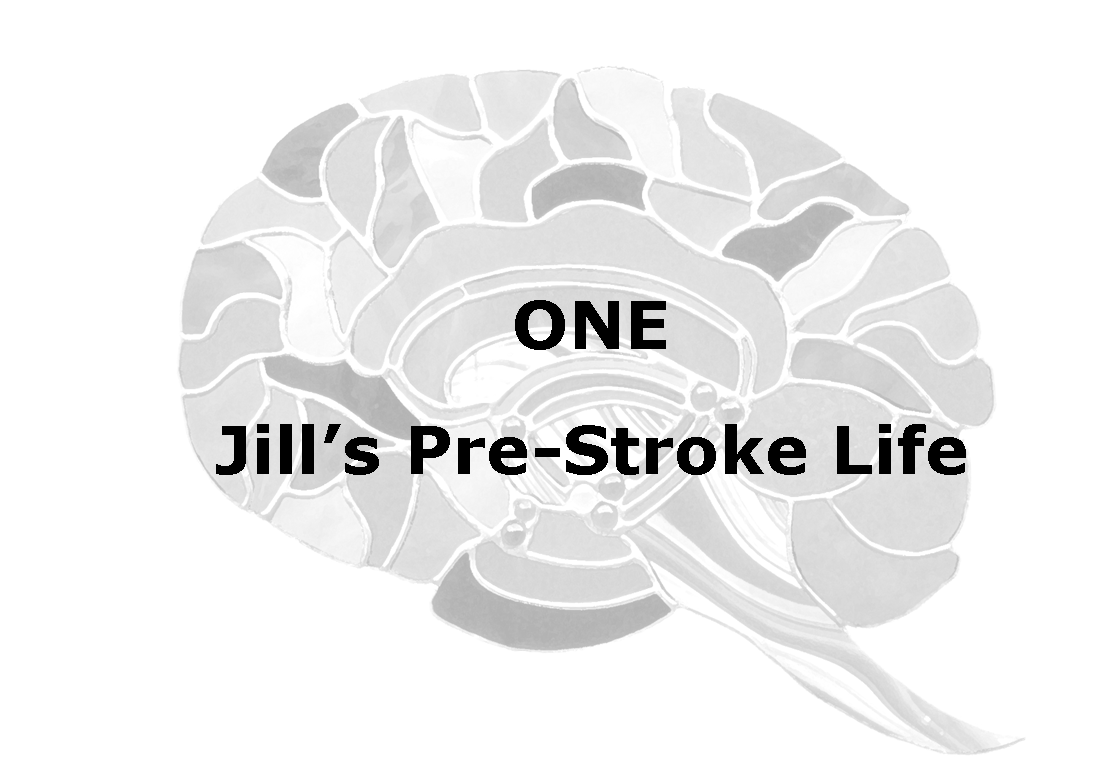
I am a trained and published neuroanatomist. I grew up in Terre Haute, Indiana. One of my older brothers, who is only 18 months older than I, is diagnosed with the brain disorder schizophrenia. He was officially diagnosed at the age of 31, but showed obvious signs of psychosis for many years prior to that. During our childhood, he was very different from me in the way he experienced reality and chose to behave. As a result, I became fascinated with the human brain at an early age. I wondered how it could be possible that my brother and I could share the same experience but walk away from the situation with completely different interpretations about what had just happened. This difference in perception, information processing, and output motivated me to become a brain scientist.
My undergraduate academic journey began at Indiana University in Bloomington, Indiana in the late 1970s. Because of my interactions with my brother, I was hungry to understand what "normal" was at a neurological level. At that time, the subject of neuroscience was such a young field that it was not yet offered on the IU campus as a formal area of specialization. By studying both physiological psychology and human biology, I learned as much as I could about the human brain.
My first real job in the world of medical science turned out to be an enormous blessing in my life. I was hired as a lab technician at the Terre Haute Center for Medical Education (THCME), which is a branch of the Indiana University School of Medicine hosted on the campus of Indiana State University (ISU). My time was evenly divided between the medical human gross anatomy lab and the neuroanatomy research lab. For two years, I was immersed in medical education and, while mentored by Dr. Robert C. Murphy, I fell in love with dissecting the human body.
Bypassing the master's degree, I spent the next six years officially enrolled in the ISU Department of Life Science Ph.D. program. My course load was dominated by the first-year medical school curriculum, and my research specialty was neuroanatomy under the guidance of Dr. William J. Anderson. In 1991, I received my doctorate and felt competent to teach Human Gross Anatomy, Human Neuroanatomy, and Histology at the medical school level.
In 1988, during my time at the THCME and ISU, my brother was officially diagnosed with schizophrenia. Biologically, he is the closest thing to me that exists in the universe. I wanted to understand why I could take my dreams and connect them to reality and make my dreams come true. What was different about my brother's brain such that he could not connect his dreams to a common reality and they instead became delusions? I was eager to pursue research in schizophrenia.
Next page
